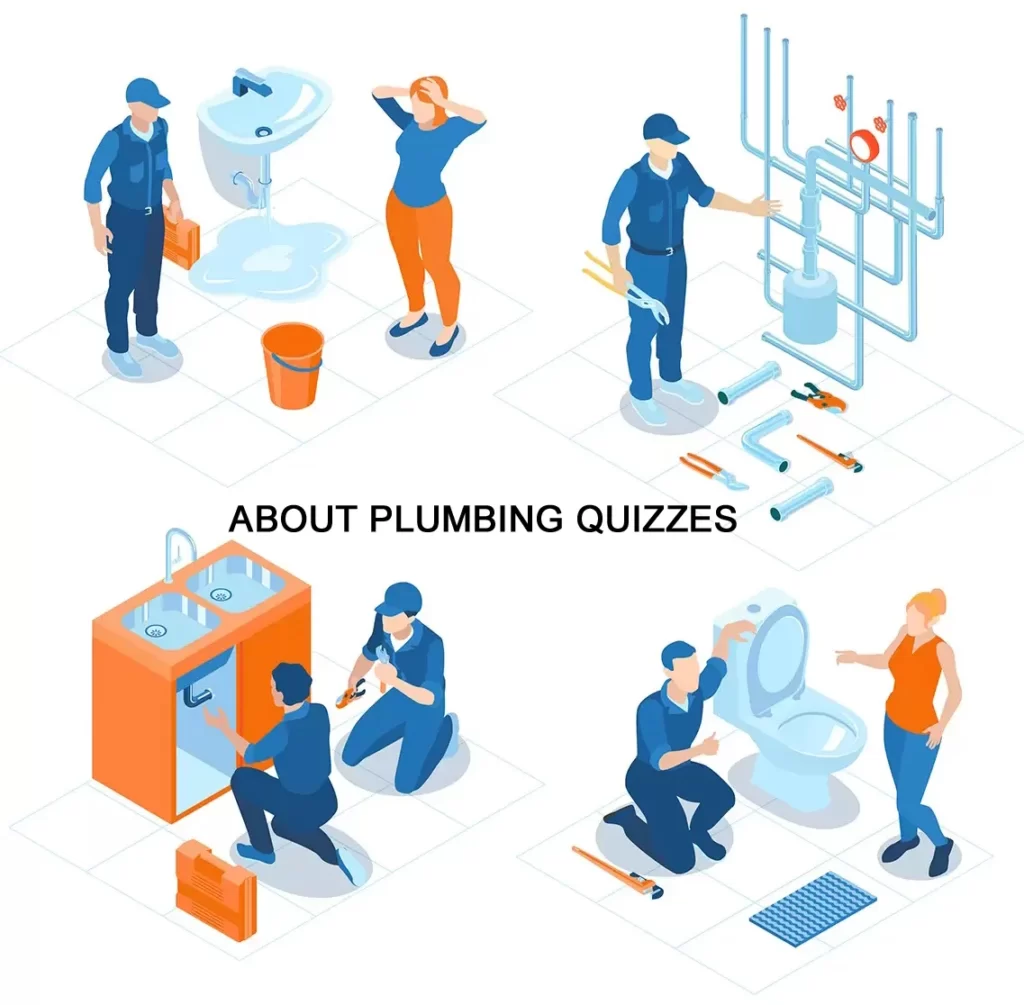If you want to test your quiz knowledge about the landscape quiz or NBC-2016 quiz or plumbing quiz, please click the link.
Plumbing is an important aspect of building design and construction, as it involves the installation of pipes, fixtures, and appliances for the distribution of potable water and the removal of waste water and sewage. Plumbing is typically designed and installed by professionals known as plumbers, who are trained in the proper installation, maintenance, and repair of plumbing systems. Plumbing plays a crucial role in ensuring that buildings have a clean and reliable water supply, as well as a functional and safe sewage disposal system. In addition to the practical considerations, plumbing is also an important factor in the overall aesthetic of a building, as the design of plumbing fixtures and the placement of pipes can impact the appearance of a space.

In addition to the basic functions of providing clean water and removing waste water, plumbing systems in buildings can also include features such as hot water heaters, water filtration systems, and appliances such as washing machines and dishwashers. These systems and appliances require a reliable water supply and a way to drain waste water, which is provided by the plumbing system.
Plumbing codes and regulations are in place to ensure the safety and proper functioning of plumbing systems. These codes specify the materials and techniques that can be used in the installation of plumbing systems, as well as the required placement and sizing of pipes and fixtures. Plumbers must be familiar with these codes and regulations and adhere to them when designing and installing plumbing systems.
Proper maintenance of plumbing systems is also important in ensuring their continued safe and efficient operation. This can include tasks such as cleaning and unclogging pipes, replacing worn or damaged parts, and inspecting systems for potential problems.
Overall, plumbing is a critical aspect of building design and construction that plays a vital role in the functionality and safety of buildings.
About plumbing quizzes
Plumbing quizzes in architecture can be used as a tool to test and assess the knowledge and skills of architects and other design professionals related to the design and installation of plumbing systems in buildings. These quizzes may cover a range of topics, including basic plumbing principles, local codes and regulations, and specific techniques and procedures for designing and installing plumbing systems.
Plumbing quizzes may be administered as part of a training program or workshop, or may be available online or in print form as a self-assessment tool. They may include multiple choice, fill-in-the-blank, or written response questions, and may focus on specific areas of plumbing such as residential or commercial systems, or cover a broad range of topics.
It is important for architects and other design professionals to have a strong understanding of plumbing principles and practices, as well as relevant codes and regulations, in order to properly plan and design plumbing systems for buildings. Plumbing quizzes can be a useful tool to ensure that individuals have the necessary knowledge and skills in this area.
In addition to testing knowledge of plumbing principles and practices, plumbing quizzes in architecture may also cover topics such as the selection and specification of plumbing fixtures and appliances, the use of computer-aided design (CAD) software to create plumbing plans and drawings, and the coordination of plumbing systems with other building systems such as HVAC and electrical.
It is also important for architects and design professionals to be aware of emerging trends and technologies in the field of plumbing, and quizzes may include questions on these topics. For example, quizzes may cover the use of water-saving devices and technologies, the integration of greywater systems, or the use of alternative water sources such as rainwater harvesting.
Overall, plumbing quizzes in architecture serve as a useful tool for ensuring that design professionals have a strong understanding of the principles and practices of plumbing design and installation, as well as relevant codes and regulations and emerging trends and technologies in the field. This knowledge is essential for the successful planning and implementation of plumbing systems in buildings.
Plumbing quizzes
We have created some quizzes for architectural students that will help them to improve their knowledge.
How much do you know about Plumbing quizzes?
Trends and tactics are constantly changing
Test your knowledge
